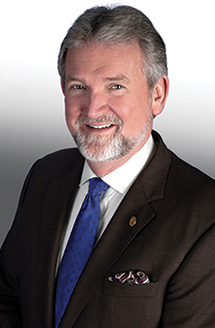Gene N. Herbek, MD
September 2014—Even as a newly minted pathologist, I knew that the CAP Surveys were critical tools to ensure patient safety and test validity. Still, I didn’t give them much thought. There was already a lot to learn; something already so well established just wasn’t on my radar.
But over time and with experience, I learned that our Surveys program of proficiency testing, which had its roots in a demonstrated need for interlaboratory comparison 60 years ago, had evolved organically into an engine of scientific advancement in our specialty. I learned that Surveys were essential drivers of the robust cultural support for peer review and continuing education that characterizes so much of what we do. I learned that they had enabled us to maintain high standards for patient care while simultaneously making state-of-the art science available to laboratories large and small, urban and rural, across the country and eventually worldwide.

Dr. Herbek
The Surveys program is managed by 450 preeminent pathologist volunteers organized across 31 discipline-specific advisory committees that report to the CAP Council on Scientific Affairs. These experts are the creative force behind the program, intimately involved in the design, evaluation, and maintenance of highly sophisticated Surveys that we could not hope to provide without their knowledge and leadership. These CAP members donate their time to explore and discuss emerging technologies, review test results as needed, assist our technical staff with difficult grading decisions, write detailed commentary to accompany test results, and create specifications for 650 Surveys products. Their intensive focus, high standards, and sophisticated knowledge enable us to offer innovative opportunities to our customers such as accuracy-based Surveys. (Ten matrix-free tests are on our test menu—more such options than are available from any other provider.)
CAP Surveys allow us to get the word out about new analytes and often to set precise specifications (as opposed to acceptable ranges) for results. They enable practical, state-of-the art education disseminated via hands-on experience. They incorporate continuing education activities and competency assessment programs for the laboratory staff that carry CE credit. In short, CAP Surveys provide knowledge that is integral to high-quality patient care. While interlaboratory comparison will always be extremely important, it is only one facet of what the Surveys program has allowed us to do.
The CAP Surveys program does meet regulatory requirements set by the Centers for Medicare and Medicaid Services under the Clinical Laboratory Improvement Amendments of 1988, but regulatory compliance is not its first purpose. As a matter of fact, CAP Surveys were in place 16 years before the first iteration of CLIA emerged in 1967. At last count, we offered Surveys for more than 1,000 analytes (just 83 are CLIA regulated). Suffice to say that if the CLIA amendments were rescinded tomorrow, almost nothing in our program would change.
Staff structured evaluation process (StEP) teams respond to requests from our scientific committees to weigh proposed Surveys for marketability to help determine whether and when to add new products and reconfigurations to the test menu. Nearly all Surveys follow the same path: They are proposed by CAP members, evaluated for customer appeal and suitability by the CAP marketing department, approved by the appropriate scientific resource committees, and shepherded by staff via StEP. Thirty-three new Surveys and anatomic pathology education programs that have come up through StEP will be available to our customers in 2015.
I would like to highlight Quality Cross-Check, a new program the CAP developed in response to a recent directive from the CMS stipulating that CLIA-regulated laboratories may not report proficiency testing results from second (or “backup”) instruments that are not routinely used to test patient specimens. This also means that the use of PT to simultaneously perform instrument cross-checks is no longer permitted. Laboratories that misinterpret this CMS directive may be subject to regulatory sanctions.
Quality Cross-Check is not a proficiency testing program. Rather, it is an instrument quality program that enables customers to monitor their secondary instruments and detect possible problems before they affect patient test results without risking violation of the CMS directive.
A second creative Surveys option worthy of special mention is the CAP Sample Exchange Registry for Alternative Assessment, a complimentary, Internet-based service that connects laboratories providing tests for which no formal proficiency testing is available. The sample exchange, founded in 2007 to meet the needs of laboratories providing esoteric tests, was expanded recently to embrace all clinical laboratory disciplines. Any three customer laboratories seeking proficiency testing for the same analyte employing the same method are eligible to register with the sample exchange registry. More than 200 laboratories have signed up to date. (To learn more, please access the registry at cap.org/sampleexchange.)
CAP Surveys were created to ensure high quality in daily laboratory testing via continuous improvement, give our customers access to benchmarks for peer comparison, and provide education to our customers that supports technical competence and professional growth. We strive, in today’s practice environment, to make the program as user-friendly and unintrusive as it can be. We do our best to hold costs down or even lower them without compromising the innovative opportunities we are committed to provide. The College offers a premium proficiency testing program and a premium laboratory accreditation program. One is not required for the other, and lower-cost proficiency testing is on the market, but CAP Surveys are a terrific value.
This is the first of two columns on CAP laboratory improvement programs. We’ll talk about a few more in this space next month.
[hr]
Dr. Herbek welcomes communication from CAP members. Write to him at president@cap.org.
 CAP TODAY Pathology/Laboratory Medicine/Laboratory Management
CAP TODAY Pathology/Laboratory Medicine/Laboratory Management
